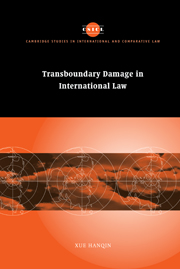Book contents
- Frontmatter
- Contents
- Foreward
- Preface and acknowledgments
- List of treaties
- List of cases
- List of abbreviations
- 1 Introduction
- Part I Accidental damage
- Part II Non-accidental damage
- 4 Liability for non-accidental damage
- 5 The doctrine of due diligence and standard of conduct
- Part III Damage to the global commons
- Part IV Underlying principles
- Bibliography
- Index
5 - The doctrine of due diligence and standard of conduct
Published online by Cambridge University Press: 22 July 2009
- Frontmatter
- Contents
- Foreward
- Preface and acknowledgments
- List of treaties
- List of cases
- List of abbreviations
- 1 Introduction
- Part I Accidental damage
- Part II Non-accidental damage
- 4 Liability for non-accidental damage
- 5 The doctrine of due diligence and standard of conduct
- Part III Damage to the global commons
- Part IV Underlying principles
- Bibliography
- Index
Summary
While it is generally agreed that international liability should not arise unless there is a breach of duty, further inquiry is necessary in relation to the specific duties on the part of States to prevent, control, and reduce transboundary damage. In this regard, the most important such duties are encapsulated by the doctrine of due diligence.
The doctrine of due diligence
The doctrine of due diligence is often said to have originated in English common law tort actions for negligence, although as a general concept it cannot be characterized as belonging to any one legal system or tradition. It is occasionally invoked by analogy in international jurisprudence. In the Alabama Arbitration of 1872 between the United States and the United Kingdom over the alleged failure of the United Kingdom to fulfill its duty of neutrality during the American Civil War, the notion of due diligence was considered by the Tribunal, which stated:
The rules of the treaty … imposed upon neutrals the obligation to use due diligence to prevent certain acts … a diligence proportioned to the magnitude of the subject and to the dignity and strength of the power which is to exercise it; a diligence which shall, by the use of active vigilance, and of all the other means in the power of the neutral, through all stages of the transaction, prevent its soil from being violated … No diligence short of this would be “due”; that is, commensurate with the emergency or with the magnitude of the results of negligence.
- Type
- Chapter
- Information
- Transboundary Damage in International Law , pp. 162 - 188Publisher: Cambridge University PressPrint publication year: 2003



